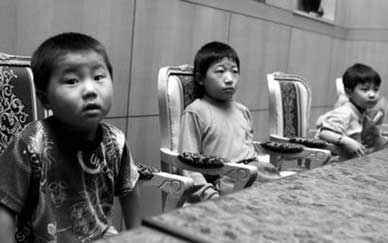![]()
Write us!
socialistviewpoint@pacbell.net
July/August 2001 • Vol 1, No. 3 •
Fightback!
HIV: The Global Curse
By Sylvia Weinstein

Young peasant children, two of them orphans due to AIDS, from a village in central China devastated by AIDS, attend a news conference in Beijing May 30, 2001. A group of seven peasants, traveling hundreds of kilometers to the Chinese capital from Wenlou village, Henan province, told the media that the Chinese government has done too little to help the villagers suffering from AIDS to buy medicine.
This is the 20th anniversary of the discovery of the HIV virus, the virus that causes AIDS. No one is quite sure how long the virus has been around but they are convinced that it is a virus that mutated from monkeys in Africa.
Since that time AIDS has infected 58 million people around the world; 21.8 million have died (36 million infected and still living), including 3 million last year. Each year, 5.5 million are newly infected—15,000 a day. A vaccine is still at least ten years away.
Since that time AIDS has infected 58 million people around the world; 21.8 million have died (36 million infected and still living), including 3 million last year. Each year, 5.5 million are newly infected—15,000 a day. A vaccine is still at least ten years away.
Since 1981, AIDS has killed nearly 450,000 Americans including 18,600 in San Francisco alone. Dr. Helen Gayle, director of HIV prevention for the Federal Centers for Disease Control and Prevention in Atlanta says, “Relatively speaking, this is still a new disease.... And it’s going to get worse before it gets better.... Clearly, the global dimensions of this disease are staggering.”
AIDS has become a worldwide pandemic that can be compared to the Black Death of the Middle Ages. But it covers more of the world and moves more rapidly than the Black Death. In sub-Saharan Africa, 25.3 million are believed to be infected; six million are infected in India and Southeast Asia. AIDS rates in the Caribbean are the highest outside Africa, and this virulent disease is moving into Latin America, China and the nations of the former Soviet Union.
Profit motive makes bad conditions worse
Dr. Gao Yaojie is a retired gynecologist in Hunan province. She was due to collect the Global Health Council humanitarian award for her efforts. The Chinese government prevented her from attending the conference and confiscated her passport. Dr. Gao has become a crusader for thousands of poor farmers with HIV when she discovered that commercial blood collection in the countryside was spreading the virus. The Global Health Council says that Dr. Gao, now in her 70s, “has run a one-woman education campaign about HIV in the poor areas of Hunan province where huge numbers of peasants have contracted HIV intravenously through blood sales.” She has printed educational material using her pension, and plans to produce an AIDS prevention guide with the $20,000 prize money from the Jonathan Mann award for health and human rights.
In Wenlou, a village in Shanghai county in China, 30 out of 800 inhabitants have died from AIDS in the past two years. At least 65 percent of the people in this village are infected. They were infected from contaminated blood. Yearly blood donation drives were held and each farmer received 40 yuan (approximately $5.00) for their blood. The collecting stations mixed their blood in tubs before collecting the plasma. The blood plasma was extracted for sale and the peasants then received red blood cells from a tainted pool using unhygienic equipment. There is real concern that this contaminated blood was sold in Chinese cities such as Shanghai and Guangzhou.
Chinese officials are fighting AIDS with ignorance and fear. They do not want the world to know the extent of HIV in their country.
There are 13 million AIDS orphans in the world today, 95 percent of them in Africa. In fact, whole areas of Africa have lost their most productive citizens—the young adult population. Those are the people who are most needed to keep the community supplied with food, shelter and clothing. Now many villages are left with the very young and the very old—the least productive. And they cannot afford the drugs that are used to treat AIDS.
Dr. Anne-Valerie Kaninda, medical adviser for Doctors Without Borders, reported that, “Ninety-five percent of people with HIV living in the developing world do not have access to treatment.” A year’s supply of drugs in the United States costs $12,000 to $15,000. They are out of the reach of people who live in nations where the annual health spending is only a few dollars per person. One drug company in India charges the cheapest for the drugs and that is $350 per person per year, which is out of the reach of millions. And that is only part of the problem when there is no clean water and no money for the simplest of blood tests. Without a vaccine, prevention efforts remain the best hope of curtailing the disease.
How can we get a vaccine quickly?
There is money out there and there are scientists who are dedicated and loyal to eliminating this modern-day “Black Death.” What can we do?
My answer is still simple. When this nation wanted an atomic bomb they spared no effort or money to make one. They hired the finest minds from this and other countries. They put them to work in Los Alamos, gave them homes, etc.—whatever they needed to work together to create that monster nuclear bomb. Surely, the struggle against AIDS is worthy of the international mobilization of the human and material resources that can conquer this monstrous disease!
Let us take the whole defense budget, $329 billion and put it to work creating good instead of evil—creating a vaccine against HIV. That’s just one years’ military budget. Tell all the drugs companies to take a leap—they will not make one cent from this vaccine. It would belong to the people. It will go for use, not for profit!
That’s what a socialist government would do. That’s what any humane government would do. Go to war against AIDS—not people! Forget the war budget! Turn it into an AIDS budget!
[Note: Information in this article about China is from the British newspaper The Guardian.]

Sylvia Weinstein is a longtime activist in both the women’s liberation and socialist movements.
Write us!
socialistviewpoint@pacbell.net